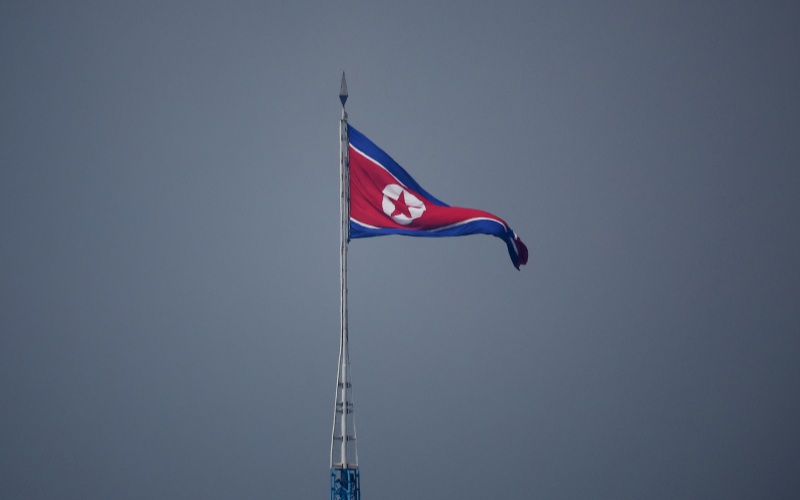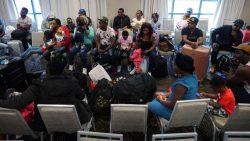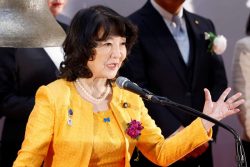
A North Korean flag flutters at the propaganda village of Gijungdong in North Korea, on July 19.
10:52 JST, November 20, 2022
SEOUL (Reuters) – North Korean leader Kim Jong Un pledged to counter U.S. nuclear threats with nuclear weapons as he inspected a test of the country’s new intercontinental ballistic missile (ICBM), state media KCNA said on Saturday.
The isolated country tested the Hwasong-17 ICBM on Friday a day after warning of “fiercer military responses” to Washington beefing up its regional security presence including nuclear assets.
Attending the site with his daughter for the first time, Kim said threats from the United States and its allies pursing a hostile policy prompted his country to “substantially accelerate the bolstering of its overwhelming nuclear deterrence.”
“Kim Jong Un solemnly declared that if the enemies continue to pose threats … our party and government will resolutely react to nukes with nuclear weapons and to total confrontation with all-out confrontation,” the official KCNA news agency said.
The launch of the Hwasong-17 was part of the North’s “top-priority defense-building strategy” aimed at establishing “the most powerful and absolute nuclear deterrence,” KCNA said, calling it “the strongest strategic weapon in the world.”
The missile flew nearly 1,000 km (621 miles) for about 69 minutes and reached a maximum altitude of 6,041 km, KCNA said. Japanese Defence Minister Yasukazu Hamada said the weapon could travel as far as 15,000 km (9,320 miles), enough to reach the continental United States.
South Korea’s military said its F-35A fighters and U.S. F-16 jets escorted American B-1B bombers as they conducted joint drills on Saturday, designed to improve their ability to quickly deploy U.S. extended deterrence assets.
On Thursday, North Korea’s foreign minister, Choe Son Hui, denounced a trilateral summit on Sunday of the United States, South Korea and Japan, during which the leaders criticized Pyongyang’s ongoing weapons tests and pledged greater security cooperation.
Choe singled out a recent series of their joint military drills and efforts to reinforce American extended deterrence, including its nuclear forces to deter attacks on the two key Asian allies.
Kim said the test confirmed “another reliable and maximum capacity to contain any nuclear threat” at a time when he needed to warn Washington and its allies that military moves against Pyongyang would lead to their “self-destruction.”
“Our party and government should clearly demonstrate their strongest will to retaliate the hysteric aggression war drills by the enemies,” he said.
“The more the U.S. imperialists make a military bluffing … while being engrossed in ‘strengthened offer of extended deterrence’ to their allies and war exercises, the more offensive the DPRK’s military counteraction will be.”
Kim referred to his country by the initials of its official name, the Democratic People’s Republic of Korea.
He ordered swifter development of strategic weapons, and more intensive training for the ICBM and tactical nuclear weapons units to ensure they flawlessly perform their duty “in any situation and at any moment,” KCNA said.
Unveiled at a military parade in October 2020 and first tested last March, the latest test of the Hwasong-17 demonstrated the capabilities of a weapon potentially able to deliver a nuclear warhead to anywhere in the United States.
Some analysts have speculated it would be designed to carry multiple warheads and decoys to better penetrate missile defenses.
The U.N. Security Council will gather on Monday discuss North Korea at the request of the United States, which together with South Korea and Japan strongly condemned the latest launch.
China and Russia had backed tighter sanctions following Pyongyang’s last nuclear test in 2017, but in May both vetoed a U.S.-led push for more U.N. penalties over its renewed missile launches.
ICBMs are North Korea’s longest-range weapon, and Friday’s launch is its eighth ICBM test this year, based on a tally from the U.S. State Department.
South Korean and U.S. officials have reported a number of North Korean ICBM failures, including a Nov. 3 launch that appeared to have failed at high altitude.
Top Articles in News Services
-

Arctic Sees Unprecedented Heat as Climate Impacts Cascade
-

Prudential Life Expected to Face Inspection over Fraud
-

South Korea Prosecutor Seeks Death Penalty for Ex-President Yoon over Martial Law (Update)
-

Trump Names Former Federal Reserve Governor Warsh as the Next Fed Chair, Replacing Powell
-

Japan’s Nagasaki, Okinawa Make N.Y. Times’ 52 Places to Go in 2026
JN ACCESS RANKING
-

Univ. in Japan, Tokyo-Based Startup to Develop Satellite for Disaster Prevention Measures, Bears
-

JAL, ANA Cancel Flights During 3-day Holiday Weekend due to Blizzard
-

China Confirmed to Be Operating Drilling Vessel Near Japan-China Median Line
-

China Eyes Rare Earth Foothold in Malaysia to Maintain Dominance, Counter Japan, U.S.
-

Japan Institute to Use Domestic Commercial Optical Lattice Clock to Set Japan Standard Time

























